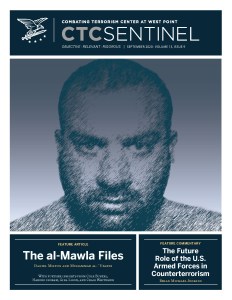From the Editor
In the September issue, it is revealed for the first time that the Islamic State’s new leader, publicly identified by the U.S. government as Amir Muhammad Sa’id ‘Abd-al-Rahman al-Mawla, was detained by U.S. forces in Iraq in 2008 and interrogated. The Combating Terrorism Center has made available on its website three of his declassified interrogation reports, and these are analyzed in a feature article by Daniel Milton and Muhammad al-`Ubaydi, who caution that claims made by al-Mawla while in custody are very difficult to verify. Based on their assessment of the three documents and their research, they conclude that “key assumptions about al-Mawla, notably his Turkmen ethnicity and early involvement in the insurgency in Iraq, may not be accurate. Moreover, statements made by al-Mawla, while doubtless trying to minimize his own commitment to ISI [the Islamic State of Iraq], suggest that his commitment may have been borne less of zeal than of serendipity. If true, this would suggest that something certainly changed in al-Mawla, as his later reputation suggests someone who ruthlessly pursued his ideology, even to carrying out genocide against its enemies. The TIRs [tactical interrogation reports] also show that al-Mawla, who, according to the timeline that he himself provided, appears to have quickly risen in the organization’s ranks in part because of his religious training, knew much about ISI and was willing to divulge many of these details during his interrogation, potentially implicating and resulting in the death of at least one high-ranking ISI figure.” The Combating Terrorism Center convened a panel of leading scholars and analysts to further discuss the three documents. Cole Bunzel, Haroro Ingram, Gina Ligon, and Craig Whiteside provided their takeaways, including on whether the revelations may hurt al-Mawla’s standing within the group.
In the other cover article, Brian Michael Jenkins considers the future role of the U.S. armed forces in counterterrorism, in a sweeping examination of the changing strategic, budgetary and threat environment. He writes: “Dividing the military into near-peer warfare and counterterrorism camps makes little sense. Future wars will require U.S. commanders to orchestrate capabilities to counter an array of conventional and unconventional modes of conflict, including terrorism.” Finally, as the global civil war between the Islamic State and al-Qa`ida intensifies, Mohammed Hafez outlines how a recent ‘documentary’ released by the Islamic State’s Yemeni branch has made clearer than ever before the areas of disagreement between the groups.
Paul Cruickshank, Editor in Chief
 Skip to content
Skip to content

